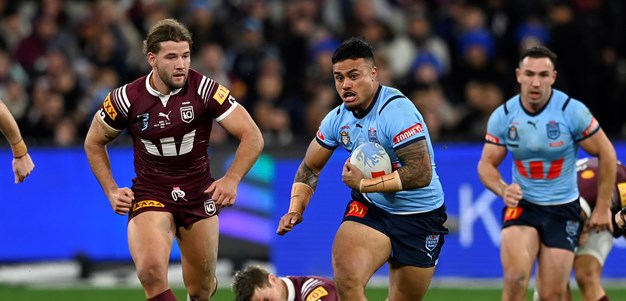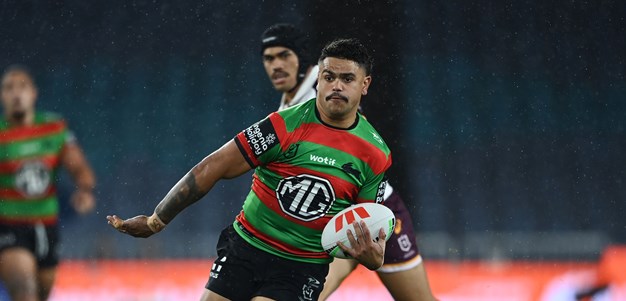A player bleeding profusely after a head knock does not mean he is automatically pulled from the field and given a Head Injury Assessment, according to NRL head of football Graham Annesley.
Melbourne Storm fullback Jahrome Hughes was not required to take an HIA after passing preliminary on-field tests following his collision with teammate Dale Finucane early in the 28-6 win over the Bulldogs at Belmore on Sunday.
Finucane appeared unsteady on his feet and had to undergo an HIA, which he failed, taking no further part in the match. Hughes got straight to his feet and made the next tackle.
The NRL Operations Manual has 17 pages dedicated to the treatment and diagnosis of head injuries, and concussion. It lists things like behavioural change in a player, being unsteady or dazed, having impaired motor co-ordination skills, as indicators the player must come from the field for an HIA.
Bleeding is not on the list.
"So if a player is bleeding as a result of a head knock it doesn’t automatically indicate that that player must leave the field," Annesley said.
"The Hughes incident started discussion because of the bleeding and it was a considerable clash of heads. Although they were involved in the same incident they displayed very different reactions to what took place."
Match Highlights: Bulldogs v Storm
Annesley said every head knock from every game was reviewed by the NRL's chief medical officer and the Integrity Unit, after each round was completed.
That review is regardless of whether any penalties or judiciary charges happened, or whether a player left the field or not.
"Because we take concussion so seriously, as do the clubs, we review all incidents on a weekly basis," he said.
"We don't jump to any conclusions if our rules have been breached or not.
"At times we'll go back to clubs and ask questions about what took place, and what factors led to decisions. But we do that behind the scenes, without any fanfare.
"We have the utmost confidence in all of the club doctors."
So in other words, if the NRL does want to investigate Storm's handling of the Hughes injury, it will be done privately.
In his weekly briefing on Monday afternoon, Annesley could not discuss the 58th-minute tackle by prop Jared Waerea-Hargreaves on Knights fullback Kalyn Ponga because the Roosters forward's dangerous contact case was not yet resolved.
Waerea-Hargreaves has pleaded not guilty, but due to the Roosters having a bye in round 12, he is not required to front the NRL judiciary until next Tuesday.
Annesley clarifies Segeyaro registration
As for the debate around the Broncos playing hooker James Segeyaro in the round 10 win over the Roosters, without having completed his new contract registration, Annesley said there was "a simple explanation".
His signed contract was lodge with the NRL, it was approved from a salary cap perspective, and submitted for registration.
"It is not uncommon for a player to be given provisional verbal registration so the player and the club are not disadvantaged in any way," he said.
"They [salary cap auditors] were completely satisfied that everything was in order subject to the remaining paperwork, which was a mere formality. It was on that basis he was provisionally registered to play. So he didn't play unregistered."
Meanwhile, there are four of the eight teams playing in round 12 – the reduced round because of Holden State of Origin preparations – that have both significant injury tolls and players in camp with NSW or Queensland.
Manly, Penrith, South Sydney and Canberra may have difficulties naming 21-man squads on Tuesday.
"Our rules require them to name 21 by tomorrow," Annesley said. "If there are any exceptional circumstances around that, the club would be in touch with the NRL.
"We've had no contact yet to the best of my knowledge, but I know some clubs are suffering with heavy injury tolls. However, none have indicated to us if they are in any difficulty in naming a team."
Finally, Annesley took great delight in showing how much quicker an NRL game is in 2019 than at the same time in 2018.
After 11 rounds last year 1567 penalties had been blown. This year it is more than 400 fewer with 1156 recorded.
Every try from Round 11






